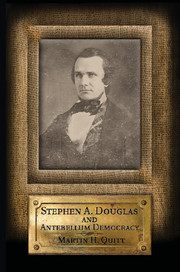Book contents
- Frontmatter
- Contents
- Acknowledgments
- Abbreviations
- Introduction
- 1 Adolescence in Vermont
- 2 Schooling, Learning, and Passing the Bar
- 3 Family Influences, Stress, and Bonds
- 4 Democratic Prodigy in Illinois
- 5 Constitutionalism, Part I
- 6 Constitutionalism, Part II
- 7 The 1860 Campaign and the Code Against Campaigning
- 8 In Lincoln’s Shadow
- 9 Douglas’s Mississippi Slaves
- Appendix Douglas’s Campaign Itinerary, 1860: June 23 to November 6
- Index
- References
6 - Constitutionalism, Part II
Slavery in the Territories
Published online by Cambridge University Press: 05 October 2012
- Frontmatter
- Contents
- Acknowledgments
- Abbreviations
- Introduction
- 1 Adolescence in Vermont
- 2 Schooling, Learning, and Passing the Bar
- 3 Family Influences, Stress, and Bonds
- 4 Democratic Prodigy in Illinois
- 5 Constitutionalism, Part I
- 6 Constitutionalism, Part II
- 7 The 1860 Campaign and the Code Against Campaigning
- 8 In Lincoln’s Shadow
- 9 Douglas’s Mississippi Slaves
- Appendix Douglas’s Campaign Itinerary, 1860: June 23 to November 6
- Index
- References
Summary
In the absence of any express opinions on the subject with reference to the Territories, the fair inference would be that the same principles that applied to the States applied to the Territories.
Stephen A, Douglas (1860)Douglas shaped territorial policy as chair of the Committee on Territories, first during his sophomore term in the House of Representatives (December 1845 to March 1847), then for a decade in the Senate (December 1847 to December 1858). He was replaced at the beginning of the second session of the Thirty-Fifth Congress, mainly because of his widely disseminated contention during his Freeport debate with Lincoln that popular sovereignty could trump the Dred Scott decision of the Supreme Court and his equally publicized opposition to the proslavery constitution for Kansas that his party’s president supported.
That he was chosen chair at the beginning of his second term in the House reflected his standing already as a sectional mediator, an expansionist, a knowledgeable constitutionalist, and a localist. He wanted Congress to be minimally intrusive. Here his intellectual challenge was greater than it was in defending state prerogatives, because the Constitution was straightforward about congressional authority over territories. The framers did not spend much time on the matter, because they did not foresee the expansion that would take place in the nineteenth century. The main concern in the 1780s about western lands was their implication for equality among the original states, and this had been addressed when the oldest ones ceded their claims to the central government under the Confederation. The Constitution simply granted Congress in Article IV, Section 3, §2 “power to dispose of and make all needful rules and regulations respecting the territory or other property belonging to the United States.” Congress read this clause to mean that it possessed an absolute power to govern the territories as it chose.
- Type
- Chapter
- Information
- Stephen A. Douglas and Antebellum Democracy , pp. 107 - 133Publisher: Cambridge University PressPrint publication year: 2012



